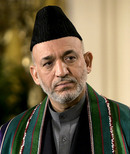 Attentive readers of Flashman will know that General Elphinstone and William Macnaghten met a dire end because they didn’t bribe the Ameers. President Karzai’s use of corruption to ensure victory has copped flak because it is seen to further destabilise Afghanistan. Fellow Presidential candidate Ashraf Ghani adds his criticism in a piece in the Times:
Attentive readers of Flashman will know that General Elphinstone and William Macnaghten met a dire end because they didn’t bribe the Ameers. President Karzai’s use of corruption to ensure victory has copped flak because it is seen to further destabilise Afghanistan. Fellow Presidential candidate Ashraf Ghani adds his criticism in a piece in the Times:
‘The success of the Nato-led intervention in Afghanistan hangs in the balance in the elections that begin today. Without a new government committed to restoring the State’s sovereignty and working with the international community to stabilise the country, the insurgency will spiral further out of control.
I have a strategy for restoring sovereignty that can bring peace to Afghanistan in the next three to seven years. Only one fifth of my plan involves a military effort, the rest consists of government reform and economic growth.
I have laid out a detailed plan to create one million new jobs in construction, mining and agriculture. These jobs will help to give Afghans a stake in society.’
Ghani’s plans are noble. Giving citizens a ‘stake in the country’ would free Afghanistan from its feudal tribalism, which should, theoretically, limit Kabul’s reliance on backhanders to secure a modicum of stability. That’s the theory at any rate. Despite the enormous sacrifice and heroism of British forces in Helmand during Panther’s Claw, an operation designed to improve election security, only 3 of Helmand’s electoral districts are deemed safe for election monitors to attend. It is impossible to give ordinary Afghans a stake in their nation under such circumstances.
Would the extra 2,000 troops requested by General Dannatt have made much of a difference? Perhaps four or five districts would have been safe, but nothing like what is necessary to bring stability to the region and country as a whole. As the Soviets discovered before us, pilgrimage to Afghanistan is the goal of jihadist fanatics across the world, and not even the warlords seem able to control these men. Nato’s military presence exacerbates the problem on a daily basis, and our forces make ever increasing sacrifices as murderous fanatics perpetuate chaos. And like Macnaghten and Elphinstone realised, only too late, it is becoming plain that leaving the Afghan feudal tribes to arrange their affairs, by corruption, bribes and, regrettably, regular doses of intimidation and violence, is the surest way to maintaining Afghan stability. I see little point in waiting to suffer another Gandamak.






Comments